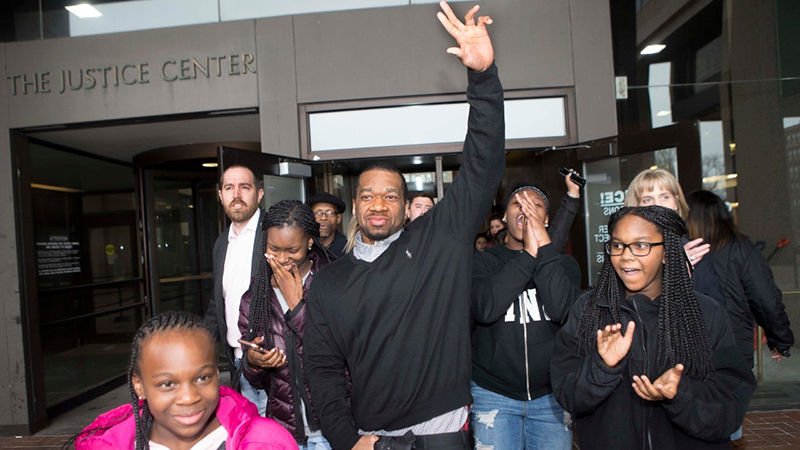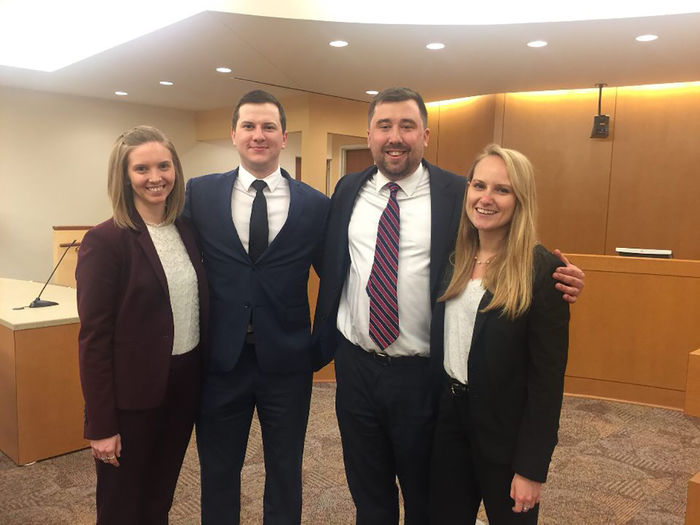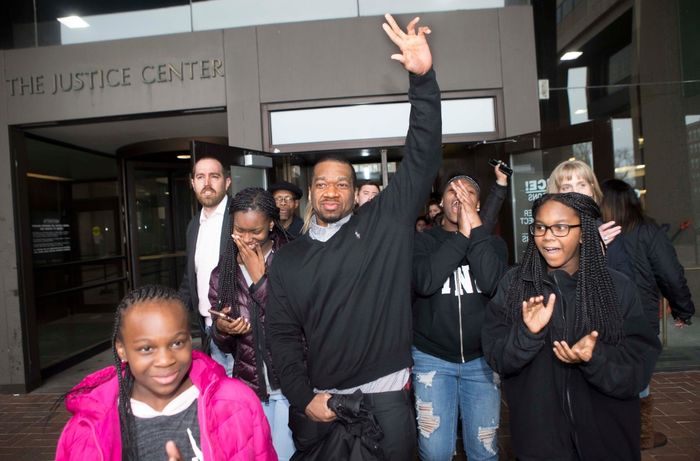

This dialog contains the full navigation menu for this site.

Sometimes in our lives, we feel drawn to a certain something—a club or a sport or an organization we want to be a part of for any number of reasons.
Jesse Knowlden experienced such a moment during a tour of the University of Cincinnati College of Law, where he applied for graduate school. The university operates the Ohio Innocence Project, a non-profit organization devoted to exonerating those who have been wrongly convicted in the state. The moment Knowlden saw the chapter’s office, he wanted to be a part of the program.
The journey to that moment of clarity wasn’t always a straight path. In 2009, Knowlden, from Williamsport, Pennsylvania, came to Penn State Altoona as a first-year student. He had always wanted to attend Penn State and figured he’d do two years at Altoona and graduate from University Park. Knowlden admits he had no idea what he was getting into when he began his college career. He didn’t know what area of study to pursue, and his first semester did not go very well.
When he went home for semester break, his dad told him, “If you always do what you've always done, you'll always get what you've always gotten." Knowlden said that advice made him realize he had to change some things. “I needed to be more serious and disciplined and work harder. I felt that I could do that at Penn State Altoona because of the professors and small classes. And that mantra from my dad stuck with me.” Knowlden ended up liking Penn State Altoona so much that he decided to finish a double major in criminal justice and history at the college.
During his senior year, Knowlden did an internship at Michael B. Cohen Law Office in Hollidaysburg. That experience led him to the decision to attend law school. However, he first wanted to save up some money and pay off loans, so he took a job with Schlumberger upon his graduation in 2013, an oil field services company, where he worked on natural gas well sites for almost three years.

From L to R: Caitlyn Idoine, Jesse Knowlden '13, Andrew Radin, Ruby Wilz, the four University of Cincinnati law students working on the Ru-El Sailor case at the time of his release from prison.
While he and his then girlfriend, now his wife, finally began searching for graduate schools, he visited the University of Cincinnati College of Law. During a tour of the college, he was shown the office of the Ohio Innocence Project (OIP). “I knew right then that I wanted to go there and be a part of that program,” Knowlden says. “I wanted my work to have a positive impact on the world, and there are no other opportunities for a law student that can compare to the Innocence Project.” He was accepted and began his studies in 2016.
The OIP at the University of Cincinnati College of Law is Ohio’s only law school-based innocence organization and one of the most successful within the international Innocence Network. Since its inception in 2003, the OIP has helped free 27 wrongfully convicted inmates. Each year, about half of the law school's incoming class applies for one of 20 positions as an OIP fellow. The work takes place during a student’s second year of law school. Under the supervision of attorneys and professors, students work in pairs to dig through case files, interview witnesses, piece together crime scenes and find the latest in forensic techniques, like DNA testing, to apply to cases.
Among the several cases assigned to Knowlden and his partner was that of Ru-El Sailor, convicted of aggravated murder in the Nov. 17, 2002, shooting death of Omar Clark. At his 2003 trial, Sailor was sentenced to 25 years to life in prison. Believing Sailor’s claims of innocence had merit, the OIP agreed to take on the case in 2016. Working with Sailor’s attorneys, one at the OIP and one in private practice, a private investigator, student fellows, UC law professors, and Cuyahoga County’s Conviction Integrity Unit, Knowlden spent countless hours continuing the progress the previous year’s students had made. The fellows conducted research and interviews, wrote pleadings and motions, made phone calls, and tried to track down witnesses.
“Over the course of the year, we communicated with clients on the phone and through emails and letters,” says Knowlden. “We visited with them and learned their stories. When you meet these people, these individuals like Ru-El, you get to know the person behind the name. You meet their families who have also been suffering for so long.”
From the beginning, Sailor claimed he knew some of the parties involved in the deadly shooting, but he wasn’t at the scene. Investigators were able to track down several witnesses who confirmed Sailor’s story while the OIP gathered further evidence to help prove their client was innocent.
Sailor was granted a hearing in March 2018 where prosecutors asked the court to overturn his conviction.

Ru-El Sailor walks out of the Cuyahoga County Courthouse with his family in March after spending 15 years in prison for a murder he did not commit.
“I was able to attend the hearing along with a lot of former clients of the Ohio Innocence Project. We were all sitting there holding our breath because even though we felt good about things, we couldn’t be sure what would happen. When the judge finally said Ru-El was free to go, there were a lot of tears. So many organizations and individuals worked hard on the case. I had a tremendous sense of accomplishment and pride to have been part of the OIP and play a role in the outcome.”
Knowlden says it was a long and often frustrating process, but a fascinating one that taught him a lot about himself and the justice system. He observed the near impossibility of overturning a conviction, even when all of the evidence used at trial is proven to be invalid. “The system is very hostile to reversing a conviction and admitting its mistakes. The innocence movement across the country is exposing some of the major problems within the system that lead to wrongful convictions, but there is still a lot of work to do. I have learned that it is the duty of every attorney, both prosecutor and defense, to seek the truth in each case and ensure a fair trial for the defendant.”
Knowlden hated to leave the OIP at the end of the year, but was incredibly grateful for the opportunity to work for the program. “I'm very lucky. The OIP is the reason that I came to the University of Cincinnati. Knowing that I had a position waiting for me gave me something to look forward to my first year and even more reason to work hard. It made me feel good about my decision to attend law school. I hated that it was only one year, because I wanted to stay. You make strong connections to the people you work with and your clients—it’s like a family.”
In fact, Knowlden has kept in touch with several clients he worked with, sending birthday cards and even becoming friends with Sailor on Facebook. “It's surreal. He’s been offered Disney World tickets, he’s gotten to go to a Cavaliers game and wear a championship ring. He was able to see his oldest daughter graduate high school. To see him living life, spending time with his family, and being a father is amazing.”
Knowlden will graduate from the University of Cincinnati College of Law in spring 2019. He is currently clerking for a firm in downtown Cincinnati and hopes to remain there for a while. He plans to stay involved in the OIP any way he can. The OIP has inspired him to think about doing pro bono work in the future and ultimately to work for a criminal defense firm. “Whether a client is guilty, he still has rights and still needs to be respected as a human being and treated with dignity. They still deserve your attention and your hard work. I’d really like to make an impact across the criminal defense spectrum.”


